EMSTA Scholars Innovation Award was formerly the EEESTA Innovation Award
The 10th EEESTA Prestige Seminar, ‘Engineering our Health’, was held in University of Hertfordshire, Hatfield, on the evening of Wednesday 12th November 2008. To mark this anniversary EEESTA determined that an award would be made to further encourage a promising scholar from the region. That was in line with of our overall remit of taking science and engineering to the wider public, and especially young people. Grant Kennedy of Verulam Boys School in St Albans received the first EEESTA Innovation Award.
At every subsequent Prestige Seminar EEESTA has been delighted to present an annual Innovation Award to celebrate the achievements of young people in science and engineering. The award takes the form of a cheque for £150 and a Certificate to an outstanding Arkwright Scholar from the region.
The Arkwright Trust is a charity which aims to promote engineering or technological careers to young people, by awarding Scholarships during ‘A’ Levels or Scottish Highers, and now has several hundred scholars each year across the whole country. See www.arkwright.org.uk.
2017: Eve Clarke of Hills Road Sixth Form College, Cambridge
Eve Clarke has always enjoyed and excelled at maths, as well as the sciences, and hopes to take her passion for these subjects into her future career in engineering. She wants to study at either Cambridge University or Imperial College London, where she plans to progress to a PhD. One prominent interest is Chemical Engineering, as it could give her the opportunity to work on new projects such as nanoengineering, and develop these technologies for medical applications, for example, using nanoparticles to distribute drugs to specific areas of the body.
Eve has attended her school’s Robotics Club for a few years and participated in a number of the projects. She helped to create and code a Lego robot for the First Lego League contest two years in a row, as well as operating the robot at the competition. She used her technical knowledge to design and build accessories for the robot, and had to learn a new programming language. Outside school, she has attended talks about the mechanics of robots and has also disassembled some machines, such as printers at home, to investigate the technology inside them.
Eve comes across as a competent person, with a clear and articulate understanding of what it means to be an engineering leader. We wish her well.
2016: Eneh Alexander-Ikwue from Henrietta Barnett School
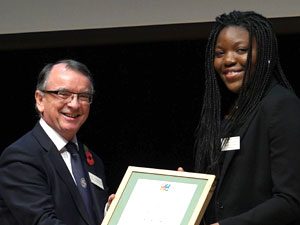
Eneh Alexander-Ikwue
Eneh is in her final year, and is expected to get A or A* on all her A level subjects, as she does so much outside of school to develop her knowledge and understanding, including taking part in Robotics workshops and Dyson Design Challenges at UCL. Her school says that Eneh is a natural problem solver, with the most natural ability to manage and develop a project from conception to completion, her coursework was brilliant and used many new and different practical techniques, and her reports were well thought through and a pleasure to read. She is applying to study Mechanical Engineering at the top Universities, and is also applying for year in industry.
2015: Owen Pearce from St Albans School
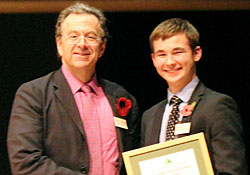
Owen Pearce
Owen Pearce is in his final year at St Albans School and is predicted to achieve three A* grades at A level in Maths, Further Maths and Physics, and is also undertaking an Extended Project Qualification. It is commendable that he has been running the Schools’ Junior STEM club for year 9s, which focuses on engineering design, where the younger pupils learn a great deal from him. He attended the Aerospace Engineering Headstart course at Liverpool. He has applied to study Engineering at Keble College Oxford and four other Russell Group universities.
2014: Theodore Gheorghiu of Chigwell School.
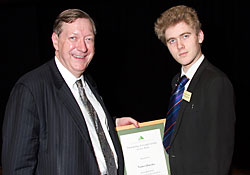
Theodore Gheorghiu
Theo Gheorghiu was in his final year at Chigwell School, studying for four A levels in Physics, Maths, Design & Technology, and Government & Politics. He had developed an interest in science from a young age, reading his first science encyclopaedia at age 7. He was interested in space exploration, and enthralled by science fiction. He had an interest in inventing new technologies in his spare time, partially inspired by his love of ideas, and assisted by a keen interest in physics. He hoped to study Engineering at Cambridge University or Imperial College London.
2013: Maxwell Munford of The Knights Templar School, Baldock
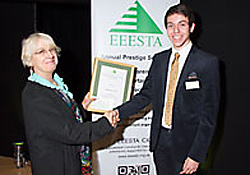
Maxwell Munford
Maxwell Munford seemed to be a versatile and resourceful young man. He had visited CERN to see the Large Hadron Collider. He had been researching, resourcing and collecting tonewood from Austria for his double bass product design project. He had designed plans for equipment to fit out a local shop in his local town, and he had acted as an ambassador for the Arkwright scheme in his school. Maxwell was planning taking work experience in Astrium early 2014, and intended to study Engineering at one of the foremost UK Engineering Universities.
2012: Oscar Gill of Redborne Upper School and Community College, Ampthill
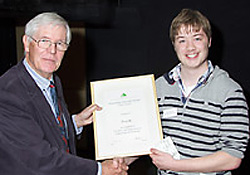
Oscar Gill
Oscar had been involved with the Headstart course program and won many of the challenges presented by the course, and had also been working on several projects at home, including research into artificial intelligence and robotics. Oscar aspired to read Engineering at Cambridge, and to be a chartered engineer and a talented inventor, which has been his dream ever since he was young.
2011: Jemma Goldstein of Haberdashers’ Aske’s School for Girls
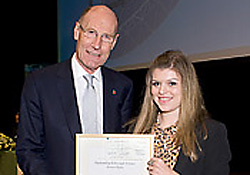
Jemma Goldstein
Jemma aspired to read Physics at Manchester and had strong interests in space and astronomy. In 2011 year she had attended Senior Space School UK at Leicester, obtained a Nuffield Bursary at the Centre for Astrophysics Research at this University, and attended the Physics Academy at Queen Mary College London.
After receiving the Award, Jemma gave a very confident ‘Thank You’ speech.
2010: James Crossley of St Albans School
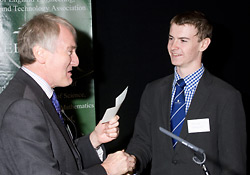
James Crossley
James Crossley was a young man of many talents. He was a key member of the award winning school Engineering and Technology Society; was actively involved with Brambleton Model Railway Club and was a theatre tech at the Alban Arena. But James was primarily a young entrepreneur. He already had three profitable businesses which he intended to develop to full maturity.
We have since heard that after finishing his A levels James went straight into running his companies full time. His maintenance company is currently doing extremely well and has recently taken on two new young people. His hire and events company currently has some large projects and events in the pipeline. He is also starting some volunteer work on an exciting project that is looking to better facilitate communication and discussion between young people, key decision makers and other interested parties.
2009: Alexis Storey of Haberdashers’ Aske’s School for Girls, Elstree
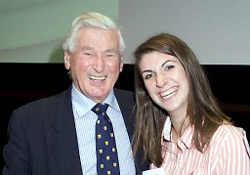
Alexis Storey
Sir William Francis, Chairman of the 2009 EEESTA Seminar had the pleasant task of presenting the EEESTA Award to Alexis Storey, an Outstanding Arkwright Scholar in her final year at Haberdashers’ Aske’s School for Girls, Elstree.
Alexis made a short thank you address in which she described her interesting work experience and how that had inspired her to study Engineering.
We have since heard that Alexis Storey who has gone up to Bristol University where she is reading for an MEng.
2008: Grant Kennedy of Verulam Boys School in St Albans
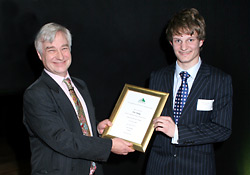
Grant Kennedy
Oliver Wells, Chairman of the ABHI Research and Innovation Policy Group presented the EEESTA Innovation Award to Grant Kennedy, a student from Verulam Boys School in St Albans. Grant has already received an Arkwright Scholarship from the Arkwright Scholarship Trust.
In accepting the award Grant expressed his thanks to all. He planned to go on to study aeronautical engineering at Cambridge, Imperial or Southampton University. We wished him well.
EEESTA Innovation Award made to Andrew Newbold
To celebrate the work done by the East of England Year in Industry (YINI) students, on Wednesday 18 June 2008 Andrew Newbold received an Innovation Award for his work with Cambridge Consultants.
Oliver Wells, Chairman of the ABHI Research and Innovation Policy Group presented the EEESTA Innovation Award to Grant Kennedy, a student from Verulam Boys School in St Albans: www.verulamschool.net
Grant has already received an Arkwright Scholarship from the Arkwright Scholarship Trust. Arkwright encourages talented 15/16 year old students to take up engineering or technological careers by awarding Scholarships during ‘A’ Levels or Scottish Highers. See www.arkwright.org.uk
In accepting the award Grant expressed his thanks to all. He plans to go on to study aeronautical engineering at Cambridge, Imperial or Southampton University. We wish him well.
EEESTA Innovation Award made to Andrew Newbold
The evening of Wednesday 18th June 2008 marked a celebration of the work done by the East of England Year in Industry students with awards being made to a number of students. EEESTA presented the Innovation Award to Andrew Newbold for his work with Cambridge Consultants.
The Year in Industry is one of the established BEST (Better Engineering Science and Technology – www.raengbest.org.uk) schemes run by the Royal Academy of Engineering – www.raeng.org.uk. YINI enables high potential young people to work in industry for a year prior to going to University. Visit www.yini.org.uk and www.etrust.org.uk to see all the schemes.
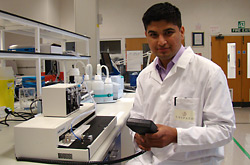
Usman Rana at Unipath Ltd.
The evening of 18th June celebrated the achievements of YINI students working in the East of England. Awards were made to a number of students with the main award from the Engineering Employers Federation —www.eef.org.uk being made to Usman Rana for his excellent work improving manufacturing processes for Unipath Ltd based in Bedford. His presentation can be seen by clicking on the link below. Usman went on to win at the National YINI Awards held in London on 11th September and is now studying Chemical Engineering at Imperial College. Read his Case Study here.
The runner up and winner of the EEESTA Innovation Award was Andrew Newbold from Cambridge Consultants for his work project managing the Iona Cube radio. The radio was presented at the Consumer Electronics Show in the Las Vegas and you can see a summary of Andrew’s presentation by clicking on the link below.
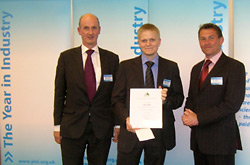
Presentation to Andrew Newbold
Pictured left is John Christopher, EEESTA Chairman, Andrew Newbold and on the right is John Hill, Chief Executive of PERA, the Innovation Network.
John Hill gave the keynote address – see below for link.
The evening was once again hosted by Andrew Herbert the Chief Executive of Microsoft Research in Cambridge who complimented each of the winners and provided them all with copies of the latest Microsoft software.
For further information on the Year in Industry go to http://www.etrust.org.uk/the-year-in-industry.
Presentations are available to download below in the original PowerPoint format or as PDFs.
Andrew Newbold’s Presentation (summary):
PDF
Usman Rana’s Presentation:
PowerPoint (2.6 MB)
PDF (665 KB)
John Hill’s Keynote Address:
PowerPoint (3.5 MB)
PDF (3.9 MB)
